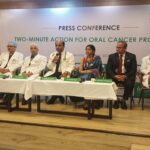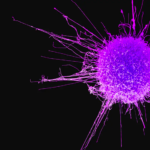- Experts highlighted the need for gender-neutral awareness on breast cancer during the mega Breast Cancer Action Month by health think tank IHW Council.
- Male Breast Cancer cases amounts to less than 1% of total cancer cases, which too can be in large numbers for populous country like India.
- Top oncologisits say male breast cancer patients fear for greater stigmatization and do not want to talk about it even after winning over it, further hampering awareness.
- Breast cancer in men may pass from Stage 1 to Stage 3 in no time, and early detection may require men to use oral tablets for treatment and surgery.
India
healthysoch
New Delhi, October 12, 2020:
Noting that many men who have recovered from breast cancer are unwilling to talk about it, doctors and policy experts underlined that men who have recovered from breast cancer should talk about it as it will increase awareness and may lead to early detection and positive outcomes. They were speaking at the discussion organised on Breast Cancer Action Month by the Integrated Health and Wellbeing (IHW) Council.
Breast cancer in men is very rare – the number of breast cancer cases in men is less than 1 per cent of the total cases. But in a highly populated country, it could translate into thousands of cases and cannot be brushed under the carpet. Many patients are not comfortable talking about cancer and male breast cancer patients are doubly reluctant, because they feel something which is seen as a woman’s disease leads to emasculation (loss of power and masculinity) of their self-esteem.
“There are some similarities and differences in breast cancer cases in men and women. Breast cancer in men may pass from Stage 1 to Stage 3 in no time. So, if caught early, men may require just surgery and oral tablets for treatment,” says Dr Somashekhar S P, President, Association of Breast Surgeons of India and Chairman & HOD Surgical Oncology, Manipal Hospital, Bengaluru.
“North India is a male dominated area. If we make men aware of the risk of breast cancer that they may face as they age, they will ensure that the women in their households are proactive and vigilant against breast cancer. It is like killing two birds with a stone,” says Dr Anand Mishra, Professor & Head, Endocrine & Breast Diseases, King George’s Medical University, Lucknow.
“While technological advancements in terms for genetic testing have evolved, they cannot be used as a large-scale screening tool as it may not be cost effective. Genes and age are non-modifiable risk factors, but they do not necessarily lead to cancer. Creating awareness which leads to early detection is the best way forward to tackle breast cancer in men,” says Dr Harshad Thakur, Director, National Institute of Health and Family Welfare (NIHFW), Government of India.
A daily-wage mechanic from Lucknow, who won the battle against Breast Cancer, Mr Mehtab Khan, who participated in the e-conclave and shared his diagnosis and treatment journey against all odds says, “One needs to be resilient when fighting cancer. The day you give up mentally, the disease will defeat you.”
“Most breast cancer awareness programs focus on women because of greater incidence of the disease reported in their gender. We need to sensitise men to the risk of breast cancer and try to make our messaging non-gender specific,” says Prabhat Kumar Sinha, Head –Communications, Policy & Patient Advocacy, Novartis Oncology.
“What we often miss about breast cancer is that certain things are common in men and women. If we focus too much on breast cancer as a ‘woman’s disease’, it may contribute to the increasing burden of the disease among men. It is important that the disease is looked at holistically to chart the road ahead,” says Mr. Kamal Narayan, CEO, IHW Council.
healthysoch







